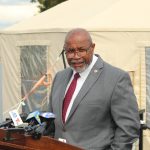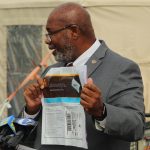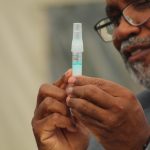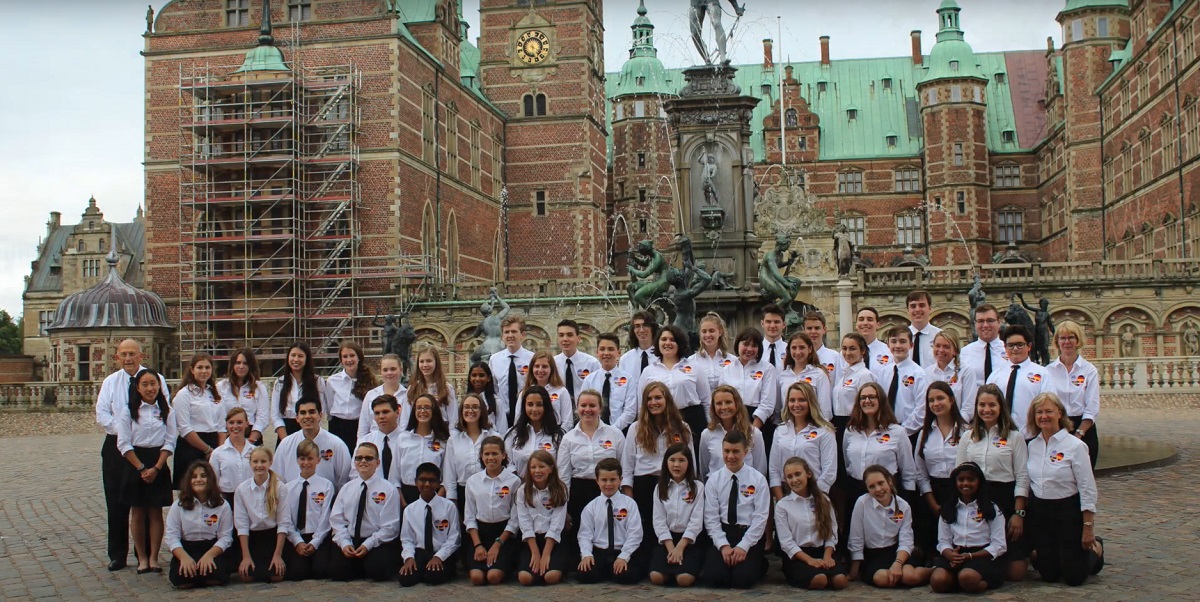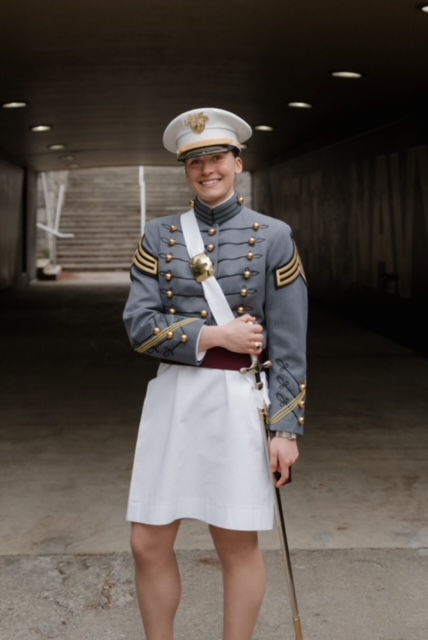- The new at-home COVID-19 test is 100-percent free for all eligible test takers and takes an estimated 72 hours to process upon receipt, Dr. Herb Conaway, of the Burlington County Health Department, pictured, explained. The tests can be ordered online and insurance companies will be billed for the costs (Krystal Nurse/ The Sun).
- Following completion of the spit collection, tests are placed in postage-paid packages for people to ship their samples, via next day air, to the laboratory for evaluation. Conaway clarified those without insurance can get a kit (Krystal Nurse/ The Sun).
- Director of the Burlington County Health Department Dr. Herb Conaway holds the collection tube where test-takers produce their saliva into. The blue liquid neutralizes the virus for the safety of scientists (Krystal Nurse/ The Sun).
Burlington County’s testing for COVID-19 has been expanded with easier on-site checks and even home kits.
Dr. Herb Conaway, director of the Burlington County Health Department, announced the new testing program during an Oct. 5 press conference. Checks can now be done via saliva sample at Rowan College at Burlington County — Mt. Laurel campus on Tuesdays and Thursdays. Home COVID-19 tests can be requested by phone or online once eligibility is established.
As of deadline, the county had 7,817 positive cases.
From March through May, testing was only allowed by appointment and only for those with symptoms. The program was then expanded to anyone who wanted a test, by appointment, in Westampton. That location ended testing at the end of summer and mobile sites for nasal swab tests were deployed throughout the county. Testing has ended for now at those sites and reopenings have yet to be announced.
The expanded program also gives people who work in the county (retail, essential employees, teachers, etc.) and county students (at RCBC or BCIT, for instance) the chance to get tested given their frequent exposure to other county residents.
Saliva tests were developed by Rutgers University in the spring and received Food and Drug Administration (FDA) approval shortly thereafter. Gov. Phil Murphy has promoted the university’s efforts to develop the test during his daily briefings. Conaway said the saliva test has the same accuracy as the pharyngeal (nasal) swab, but without the discomfort of swabbing the nose.
“Testing is helpful and the sooner we can get it to people, the more rapidly we’ll be able to turn it around,” he said. “We can get on top of those little outbreaks that we see occurring more and more as people begin to return to normalcy, which they must do.”
Pre-screenings for the test, either at home or at RCBC, require proof of insurance for those who have it. The county uses insurance information to bill private and public companies for the test, and under federal law, patients will not incur out-of-pocket costs. Those without insurance are also eligible, with those tests financed by a $3-million grant from the state’s federal CARES Act (Coronavirus Aid, Relief and Economic Security) funding. Along with 12 others, Burlington County was ineligible for federal CARES funding because it did not meet the 500,000 population threshold. The state then redistributed some of its $2.4 billion CARES money.
Registration for the home test is live — at HomeCOVIDTest.org — and requires proof of residency or employment, wherever applicable. Health department staffers will review the information before ordering a test kit from Vault, the company licensed to receive and deliver the kits to labs at Rutgers.
Children 5 and under are ineligible for the home test, but can receive a test at RCBC.
Test takers at home will be instructed to follow a link and schedule a Zoom video call, where a medical professional will guide them through the spit sample process. Conaway advised people to refrain from oral activities at least 30 minutes prior (eating, brushing teeth, drinking, taking medication, smoking, etc.) to the test to avoid inaccurate results.
“Then, take the viral preservative, screw it on and it releases the preservative in the test tube,” he, Conaway, explained. “It kills the virus, but, yet preserves it so the genetic material could be tested in the lab. The results of the lab and the test will be either on the website or you get a secure email about it (within 72 hours).”
If a test is positive, contact tracers will begin the process of identifying potential infectors. Normal activities can resume, but Conaway advises that everyone wear a face covering, since infections can occur in settings such as school, restaurants and bars and job sites.
“When you’re out of your house and engage with family members you do not see every day, you’re at work, shopping or in the park on a busy trail, wear that mask,” Conaway noted.
“It protects not only you, but those around you, and that’s an important part of our responsibility as citizens in a free republic such as ours.”

